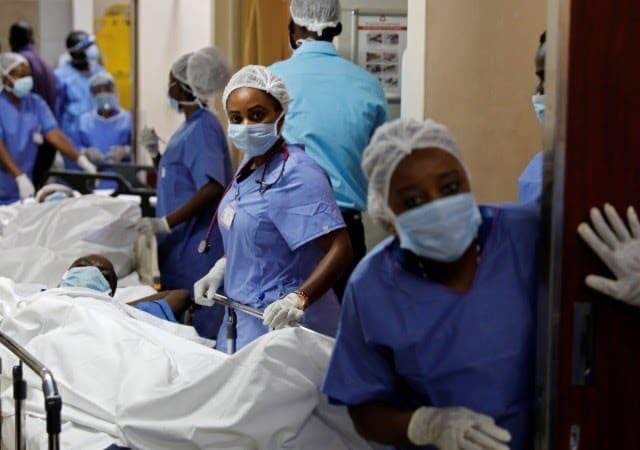
Nurses on The Front Lines In Washington-area Hospitals Describe How They Cope with COVID-19 Schedules, Fears
What’s it like to be on the hospital front lines in suburban Washington, treating COVID-19 patients? Two ICU nurses working in Prince George’s and Montgomery counties recently described the fears they must face down daily as they care for what one described as the “sickest of the sick.”
“Nobody is prepared for a pandemic, and nobody is prepared for a brand-new virus,” said 25-year-old Miracle Iweala, a registered nurse at the University of Maryland Prince George’s Hospital Center’s Intensive Care Unit in Cheverly, Maryland.
He said interacting with patients’ families can be hard. “It’s tough because you have to be realistic with the family when they call in, and you have to paint them a real picture. I’m not going to lie and say it’s looking good, and it’s not looking good,” Iweala said.
He said he wakes up every morning, goes into work, puts on his surgical hood, goggles, respirator and shoe covers, and enters the ICU. He assesses each of his patients, provides them with medications and monitors them throughout his 12-hour shift.
Iweala is no longer dealing with his regular two or fewer patients; he said he is now monitoring three or more COVID-19 patients in critical condition and leaving 30 minutes to an hour later than his usual shift. He updates their families daily, sometimes with devastating news.
Seeing patients in critical conditions every day has impacted Iweala, especially those with a Do Not Resuscitate order. He said he relies on prayer before and after his shift to keep his mind right.
Twenty-four-year-old Fatima Bangura, an ICU registered nurse at Holy Cross Hospital in Silver Spring, Maryland, started her new job in early March just as COVID-19 cases were reported in the state. Although she is currently going through orientation, she said she takes care of COVID-19 patients every day.
“My unit is supposed to be surgery,” Bangura said. But “I haven’t been able to see any heart attacks, no balloon pumps, no stomach surgeries, no nothing. All I see is COVID, COVID, COVID.”
With the virus being new, Iweala and Bangura are discovering further information every day.
Spokespeople for UM Prince George’s Hospital Center and Holy Cross Hospital were unable to provide information on the number of patients being treated, saying they are focused on patient care. The Maryland Department of Health releases daily COVID-19 data by county and state, not by individual hospitals.
State data show Prince George’s County has the highest number of COVID-19 cases in the state, with 9,892 of the state’s 34,061 cases as of May 12, and 355 of the state’s 1,643 deaths.
Montgomery County follows right behind in confirmed cases, with 7,130 as of May 12. The county was leading the state in COVID-19 deaths, with 373.
Both nurses said they were not afraid of the virus when they first began treating patients, but as cases continued to mount, they realized how serious it was.
Bangura described the entire pandemic as “anxiety-producing and worrisome” and said dealing with it every day does not make it any better.
Dr. Justin Hopkins, a clinical psychologist in Washington, said nurses not knowing how long this pandemic will last and servicing a higher volume of patients is “a hotbed for stress, anxiety, and worry alongside all of the uncertainty of the virus itself.”
“They’re dealing with chronic stress, which is especially detrimental to the body and the mind, where you’re kind of in a state of ongoing alertness,” Hopkins said. “It’s important for our first responders just to be mindful of how much emotion they’re putting aside and acknowledge that what they’re taking on every day is not normal, and they’re going to need space to address it and heal from it at some point.”
Both nurses live at home with their parents, and although each of their mothers works in the medical field, bringing the virus home to their loved ones is still a concern.
Iweala said it’s important that “what you interact with at the hospital doesn’t follow you home or affect you personally.”
He sometimes stays the night at a hotel at no-cost, sponsored by Hilton and American Express through his membership with the American Association of Critical-Care Nurses.
On those nights when he does have to go home, he said he strips his uniform off in the garage and sanitizes everything in his pockets, including his phone. He goes straight to the bathroom to take a shower, then gargles salt water to remove any bacteria that would go to this respiratory system. He said he avoids interacting with his family members as much as he can.
Bangura said she has also created a routine for herself when she gets off work. After every shift, she goes straight to the basement when she comes home and takes a shower. She also keeps all her uniforms together in the basement and washes them separately from any of her other laundries.
Iweala and Bangura are spending their off-time watching movies, playing video games, socializing with their friends through text, Facetime, and social media to cope with the pandemic. Still, as extroverts, they said they miss going out.
But both are encouraging people to stay home until a few weeks after the governor’s stay-at-home order is lifted.
“If there is anything I can emphasize, do not be a part of that first group of people” that emerges after the order is lifted, Iweala said. “Give it a week or two weeks if you can. You want to see if when people go back out if the number of cases goes up, down, or stay the same.”











